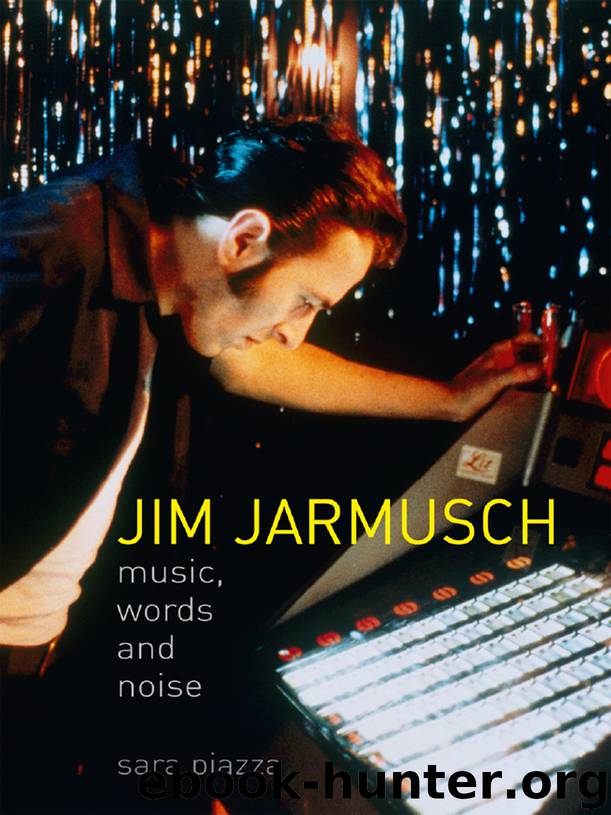Jim Jarmusch by Sara Piazza

Author:Sara Piazza
Language: eng
Format: epub
Publisher: Reaktion Books
‘Faces and Names’9
Having established that for Jarmusch the ironic register implies the reaffirmation of the general principle of relativism – because in the cinema just as in life, both the serious and non-serious are always combined – one of the comic motors he prefers is the play on personal names. Not a device of little import, but one that hints at the person’s very identity. The name, the presumed unassailable bastion that encompasses the character and sums up the essence of someone, because it is normally coupled with the verb ‘to be’, can instead be a point of discussion, a source of misunderstanding, can even become ridiculous or the brunt of hysterical gags. Jarmusch’s particular passion for this play on names runs through his entire filmography to the point that it has become a recognized ‘trademark’.
I would like to touch upon certain examples from Stranger Than Paradise to Only Lovers Left Alive, in some cases quoting passages from the screenplays.
Already in Stranger Than Paradise, the character of Willie/Bela (John Lurie) clearly personifies the link, and the contrast, between name and identity. Willie often stresses the fact that in no way does he want to be called by his real Hungarian name: his new American identity compels him to forget that part of himself. Even if, in Willie/Bela’s case, irony plays a less important role, there is an exemplary scene in which a sort of bizarre Dante-esque ‘law of retaliation’ is applied: when Bela tries at last to be amusing with cousin Eva, and wants to tell her a joke, his memory lets him down. Sitting with her at Aunt Lotte’s kitchen table Willie throws in the towel after a couple of false starts, forced to admit that he has forgotten the punchline. ‘But it’s good!’ he promises Eva, who laughs nonetheless. The paradox is that in this case one laughs at the lack of the punchline, a paradox that brings to mind the condition of Willie/Bela: if the amputation of a slice of Willie’s Hungarian identity is not exactly funny, the absence of the punchline is.
In Down By Law, the name game is far more direct and deliberately comical. The characters played respectively by Lurie and Waits are called Jack and Zack and, in addition to their rhyming names, are more alike than they would wish to admit. In the balance between the three characters, the two Americans play straight men to the Italian. It is inevitable that Bob/Benigni, struggling with the English language right from the moment he enters the film, is forced into a sort of incessant verbal combat to get their names right – without ever really succeeding. Here the underlying theme to the superficial gag is not so much about identity, as with Willie/Bela, but rather about the already mentioned search for solidarity, understanding and a common language that Bob wants more than anything else to establish with his two new ‘American buddies’.
The gag on names in Mystery Train alludes instead to the more political theme of racial intolerance.
Download
This site does not store any files on its server. We only index and link to content provided by other sites. Please contact the content providers to delete copyright contents if any and email us, we'll remove relevant links or contents immediately.
Shoot Sexy by Ryan Armbrust(17728)
Portrait Mastery in Black & White: Learn the Signature Style of a Legendary Photographer by Tim Kelly(17006)
Adobe Camera Raw For Digital Photographers Only by Rob Sheppard(16976)
Photographically Speaking: A Deeper Look at Creating Stronger Images (Eva Spring's Library) by David duChemin(16687)
Bombshells: Glamour Girls of a Lifetime by Sullivan Steve(14075)
Art Nude Photography Explained: How to Photograph and Understand Great Art Nude Images by Simon Walden(13046)
Perfect Rhythm by Jae(5403)
Pillow Thoughts by Courtney Peppernell(4284)
The Book of Joy by Dalai Lama(3986)
Good by S. Walden(3558)
The Pixar Touch by David A. Price(3439)
A Dictionary of Sociology by Unknown(3085)
Fantastic Beasts: The Crimes of Grindelwald by J. K. Rowling(3058)
Stacked Decks by The Rotenberg Collection(2883)
Humans of New York by Brandon Stanton(2873)
Read This If You Want to Take Great Photographs by Carroll Henry(2711)
On Photography by Susan Sontag(2639)
Insomniac City by Bill Hayes(2558)
Photographic Guide to the Birds of Indonesia by Strange Morten;(2534)
